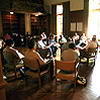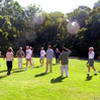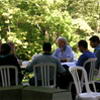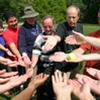PROGRAM
Pattern Languages of Programs (PLoPTM) conference is a premier event for pattern authors and pattern enthusiasts to gather, discuss and learn more about patterns and software development.
The conference program includes the following kinds of sessions:
- Invited Talks
- Accepted Papers: for Writers' Workshops.
- A Shepherding Workshop
- Focus Groups
- A Panel Discussion
- Games
- Day-by-Day: Wednesday, Thursday, Friday, and Saturday
PLoP and the Bootcamp will be held at Allerton Park, Monticello, Illinois, USA.
Conference at a Glance
The BootCamp, a special full-day Pre-PLoP activity for newcomers, will happen on Wednesday, October 23rd, 8:30-17h00.
The PLoP conference starts on Wednesday evening, October 23rd, at 18:00, with the traditional games and pizza party and it will conclude on Saturday, October 26th at 17:00.
Invited Talks
| "What Christopher Alexander thought was wrong with A Pattern Language and How To Fix It." |
| In this talk I go back to the six years that I worked directly with Chris Alexander on the
manuscripts of The Nature of Order and all the informal discussions we had about the shortfall
of A Pattern Language. Some of these shortfalls are really about how people misread and misused
APL. Other failings are inherent to the work itself. The obvious next step involves fixing all these
problems. The talk is meant to be very hands-on and pragmatic so that some of these shortfalls and possible avenues for improvement can be explored during the conference and during the writers' workshops. Obviously, Alexander is concerned about building in physical space with physical materials, so those listening to the talk will have to work with me in 'translating' for the PLoP domain. Dr. Jenny Quillien's formal education in France earned her degrees in anthropology, ethno-linguistics, and industrial psychology. She has worked internationally in both academic and organizational settings. An abiding interest in vernacular architecture led her to the writings of Christopher Alexander and then to working directly with Alexander on the draft manuscript of The Nature of Order. A few years later, her university colleague, Dave West, introduced her to the Agile Software community and PLoP. She has published Delight's Muse, which is a beginner's guide to Alexander's magnum opus, The Nature of Order, and, more recently, Clever Digs: how workspaces can enable thought, a book on workspace design. |
| "Wiki as Pattern Language" |
| I will talk about patterns, modular knowledge and especially knowledge informed by
measurement. I will describe how federated wiki democratizes interpretation of
numbers much the same way the original wiki democratized the interpretation of
words. This will not duplicate content in the paper we have submitted for review. Ward Cunningham programs every day at New Relic. He continues to develop the unique data handling capabilities of Federated Wiki, a project rooted in his service as Nike's open-data fellow. Ward co-founded the consultancy, Cunningham & Cunningham, Inc. He has served as CTO at CitizenGlobal and AboutUs, a Director of the Eclipse Foundation, an Architect in Microsoft's Patterns & Practices Group, the Director of R&D at Wyatt Software and as Principle Engineer in the Tektronix Computer Research Laboratory. Ward is well known for his contributions to the developing practice of object-oriented programming, the variation called Extreme Programming, and the communities supported by his WikiWikiWeb. Ward hosts the AgileManifesto.org. He is a founder of the Hillside Group and there created the Pattern Languages of Programs conferences which continues to be held all over the word. |
Focus Groups
| "Cloud Computing Patterns" | |
| Cloud computing is an emerging computing paradigm that is beginning to rewrite the old
ways of building large scale systems. While a number of best practices have been proposed for cloud
computing, a definitive set of patterns remains to be written. In this focus group, I propose a
brainstorming session similar to the one at the origin of the book "Enterprise Integration Patterns"
to begin enumerating the fundamental patterns of cloud computing. This brainstorming session is open to anyone interested with a background in cloud computing. We will be whiteboarding potential "patlets" (e.g. simple problem/solution pairs) and trying to work out a initial pattern map of how the patlets relate to one another. It may be helpful for attendees to review existing material in this area such as: http://cloudcomputingpatterns.org/ Kyle Brown is a Distinguished Engineer with IBM Software Services for WebSphere and the CTO for Emerging Technologies within IBM Software Services for WebSphere. He has well over twenty years of experience in designing and developing large-scale software systems both with IBM and previously with Knowledge Systems Corporation and is an expert at Software Patterns, Cloud Computing, SOA and Object Oriented design. He is the author or co-author of eight books, holds seven patents, has written well over 60 articles and papers, and a well-known presenter at industry conferences. |
|
| "What do we understand by 'levels of abstraction' and 'levels of scale'?" | |
|
This proposal for a focus group discussion actually comes from the experience of reading several of the submitted papers (notably "Pattern Diagnostic System - A Diagnostic Approach to Pattern Applications", "Conversations with Alexander", "Finding the 'right' level of abstraction for patterns", and "Wiki as Pattern Language"). These papers all, in one way another, dance around the topics of levels of abstraction, levels of scale, grammar rules in APL, and how to grow software or a pattern language. Although there are bits and pieces in these papers, nobody has really 'nailed' it. The organizers of the focus group haven't 'nailed' it either but are interested in getting closer and willing to write up notes from a discussion. David West has forty years professional experience designing and implementing large-scale software projects and twenty-five years as a Professor of Computer Science Software Engineering. He is the author of Object Thinking and will complete four new books on design and development of complex systems in 2014. David has an eclectic background that includes formal education in Asian Philosophy and Cultural Anthropology as well as Computer Science and Business. For bio of Jenny Quillien see above. |
|
PLoP Workshop
| "Shepherding workshop" | |
|
Bob Hanmer, Thursday, 10/24, 18:30-20:00 |
|
| Shepherding is a cornerstone of both the PLoP Writer's Workshop and the pattern community itself. All of the authors at PLoP have been the recipients of shepherding. After being shepherded a few times the community asks that authors begin to reciprocate and begin shepherding submissions to future conferences. As a new shepherd, where should you start? In this workshop we'll talk about shepherding, how to be a good shepherd and some tips to make you more effective working with your sheep. This workshop is intended for first-time shepherds as well as the experienced shepherd who will be invited to share their tips. |
|
Panel Discussion
| "Panel Discussion" | |
|
organized by Joseph W. Yoder and Richard P. Gabriel, Friday, 10/25, 19:00-21:00 |
|
| It was almost 20 years ago when a small, eclectic, and informal group
gathered in Ben Lomond, California, for their yearly retreat and in the
redwoods that Spring hatched a plan that was PLoP. In response to the
criticism that by putting together such an unconventional conference
they would show they didn't know what they were doing, one of them
suggested, "let's pretend to know." When PLoP got going, the Gang of Four book was just being published and there were unknowns and hype - no one had a clear idea how patterns would influence the software community. This panel will reflect on historical events affecting the software community and how those events will influence the course of software over the next 20 years. We don't want recitations of history but analysis and prediction. We'll start with a panel of historical figures discussing these ideas while looking forward, and evolve into a fishbowl including the audience doing the same. Joseph W. Yoder is a founder and principal of The Refactory, Inc., a company focused on software architecture, design, implementation, consulting and mentoring on all facets of software development. Joseph is an international speaker and pattern author, long standing member of the ACM, and the President of The Hillside Group, a, a group dedicated to improving the quality of software development. Joseph specializes in Architecture, Analysis and Design, Java, C#/.NET, Smalltalk, Patterns, Agile Methods, Adaptable Systems, Refactoring, Reuse, and Frameworks. Additionally, Joe is an accomplished author, having written a few dozen published papers, including being an author of the Big Ball of Mud pattern, which illuminates many fallacies in the approach to software architecture. Additionally Joe has trained and mentored developers on various types of software applications. Joseph W. Yoder evolved from the Software Architecture and Patterns group at the University of Illinois. Joe has worked on various projects during his career that has incorporated many technologies. These range from stand- alone to client-server applications, web applications, web services, cloud computing, service oriented architecture, multi-tiered, various databases, object-oriented, frameworks, human-computer interaction, collaborative environments, and domain-specific visual-languages. In addition these projects have spanned many domains, including Medical Information Systems, Financial Systems, Ordering, Import, Invoicing, Print, Shipping, Warehouse Management, Manufacturing, Medical Examination, Statistical Analysis, Scenario Planning, Client-Server Relational Database System for keeping track of shared specifications in a multi-user environment, Telecommunications Billing System, and Business & Medical Decision Making. Joe teaches Agile Methods, Design Patterns, Object Design, Refactoring, and Testing in industrial settings and mentors many developers on these concepts. Other projects involve working in both the Java and .NET environments deploying Domain-Specific Languages for clients. Joe presents tutorials and talks, arranges workshops, and organizes leading technical conferences held throughout the world, including international conferences such as Agile, Agile Portugal, Encontro Ágil in Brazil, AOSD, CBSoft, JAOO, QCon, PLoP, AsianPLoP, SugarLoafPLoP in Brazil, OOPSLA, ECOOP, SATURN, and SPLASH. Joe thinks software is still too hard to change. He wants do something about this and believes that with good patterns and by putting the ability to change software into the hands of the people with the knowledge to change it seems to be on promising avenue to solve this problem. Joe currently resides in Urbana, Illinois. Dr. Richard P. "Dick" Gabriel was a leader in the Lisp/OOP community, known for his book "Innovation Happens Elsewhere", his essay "Lisp: Good News, Bad News, How to Win Big", and the "Gabriel" Lisp benchmarks that became a standard way of benchmarking Lisp implementations. Dr Gabriel is also the recipient of the recipient of Association for Computing Machinery's 1998 Fellows Award, and the 2004 Allen Newell Award. With a Ph.D. in Computer Science from Stanford University in 1981, and an MFA in Poetry from Warren Wilson College in 1998, Dr Gabriel was described in the Alan Newell Award as stretching "the imagination of computer scientists with ideas and innovations from other fields" and he combines these into presentations to technology audiences that he describes as being "audacious set-piece guerilla performances". Dick has been a researcher at Stanford University, company president and Chief Technical Officer at Lucid, Inc., vice president of development at ParcPlace-Digitalk, a management consultant for several startups and Sun Microsystems, and Consulting Professor of Computer Science at Stanford University. |
|
Games
| "Games" | |
|
Games master is George Platts, few times, see schedule |
|
| George Platts about himself: I first assisted PLoP, as "Tangential Thinking Co-ordinator", in 1995 and I have worked at over 10 PLoPs and mini-PLoPs (and at all 18 EuroPLoPs - as "Querdenker Koordinator", and at a couple of Viking PLoPs and at Mensore PLoP in Japan in 2001. I also assisted, from a distance, Guru PLoP in Bangalore in 2013). | |
Day-by-Day
| Wednesday, October 23rd - Bootcamp | |
| 07:30-08:30 | Breakfast |
| 08:30-12:00 | Bootcamp - Parts of a Pattern |
| 12:00-13:00 | |
| 13:30-17:00 | Bootcamp continues and On-site shepherding with a mentor |
| 17:00-17:30 | |
| 17:30-18:00 | Newcomer intro |
| 18:00-?? | |





